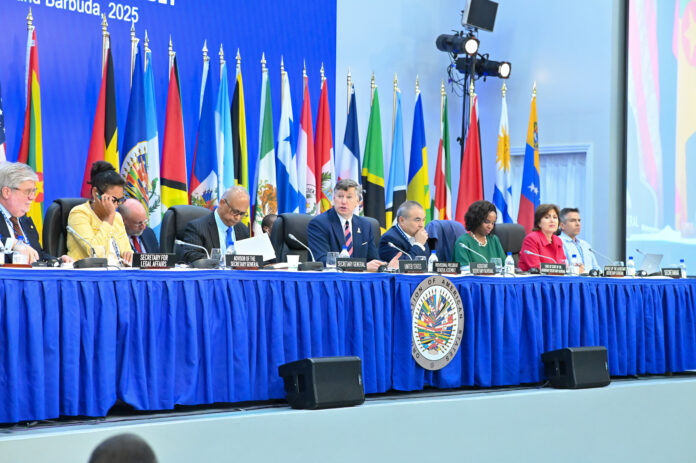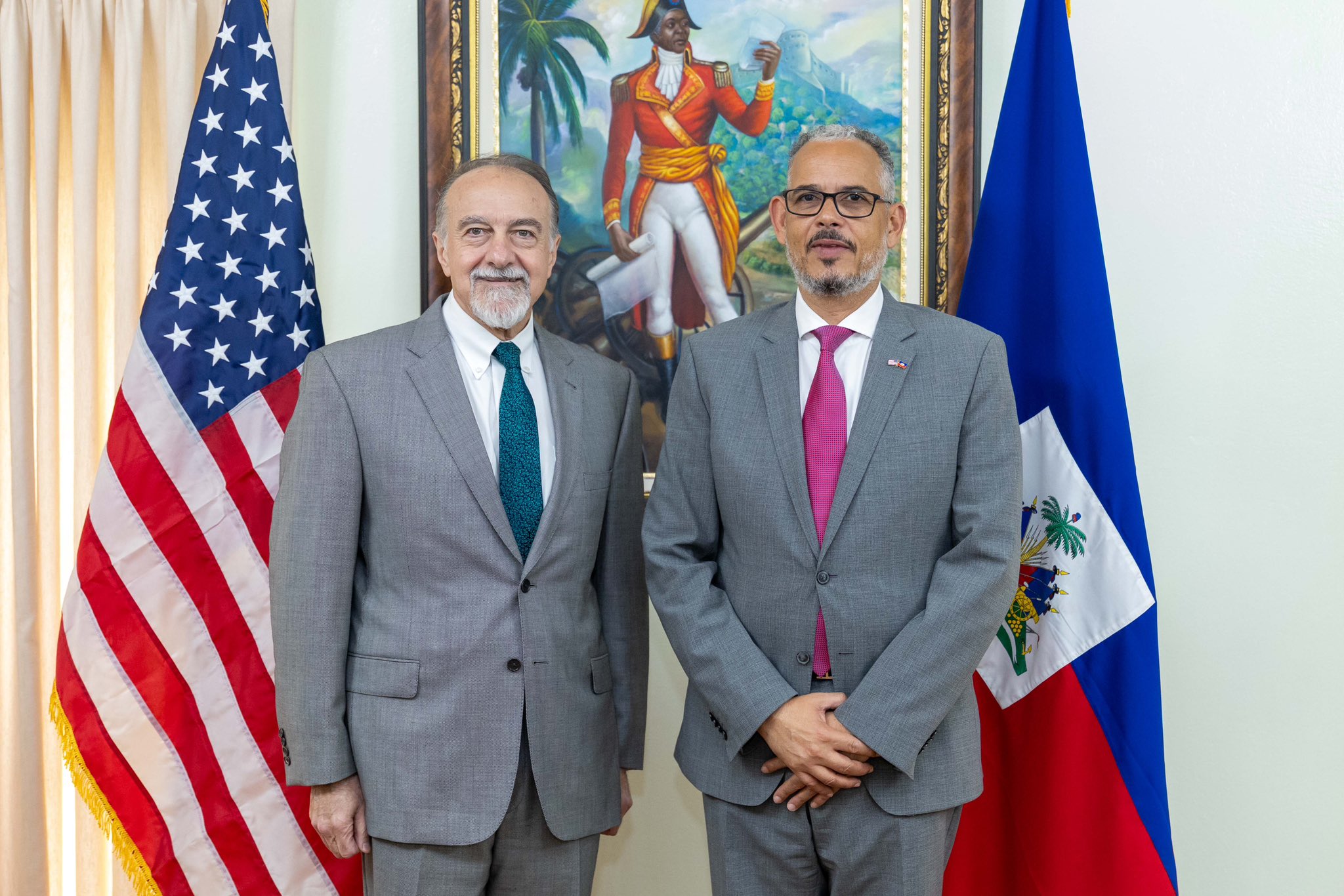
(Français)
Washington is trying to figure out how to restore neocolonial order in Haiti, or just manage the dangerous disorder that currently reigns there.
A U.S. Senate delegation, along with the new U.S. Chargé d’Affaires in Haiti, Henry Wooster, took stock of Haiti’s situation on Jun. 27 in Port-au-Prince and met with the Haitian National Police (PNH) chief Rameau Normil at police headquarters next to the airport. Wooster also met with de facto Haitian Prime Minister Alix Didier Fils-aimé on Jun. 28.
The meeting came as Kenyan President William Ruto warned the UN Security Council (and principally Washington) in a Jun. 25 letter that the failure by the “international community” to fund the Multinational Security Support mission (MSS) could lead Kenya to “reconsider its engagement” to lead the international mercenary force in Haiti.
In a letter to June’s UN Security Council (UNSC) President Mohamed Irfaan Ali and UN Secretary General António Guterres, Ruto complained that less than 40% of the 2,500 troops planned for the MSS have been deployed due to funding shortfalls and that only 11% of budget required for the MSS’s first year of operations has been received. (The first Kenyan troops arrived in Haiti on Jun. 25, 2024.)

Ruto wrote that crucial contracts for the MSS’s logistics are about to expire and that “we will be forced to review our commitment” to the MSS unless the UNSC comes up with a way to fund the mission before its second one-year mandate expires on Oct. 2, 2025.
The MSS is not an official UN “peace-keeping operation” in Haiti like the MINUSTAH was from 2004 to 2017. It is instead, until now, a U.S.-(under)funded mercenary force which merely has a UNSC “blessing” to deploy in Haiti. This is the compromise that was struck between Washington with China and Russia which oppose the U.S. using the UN as its “neocolonial policeman” in Haiti for a third time in 30 years.
The Dominican Republic’s President Luis Abinader also sent a letter to the UNSC, co-signed by three former Dominican presidents – Danilo Medina, Leonel Fernández, and Hipólito Mejía – proposing to transform the MSS into a “hybrid mission” with shared logistical and operational leadership.
Also on Jun. 27, the Organization of American States (OAS, Washington’s Ministry of Colonial Affairs) adopted a resolution on Haiti at its 55th Regular General Assembly in Antigua from Jun. 25-28, 2025 to encourage other OAS member states to meddle in Haiti, that way lifting some of the burden on Washington.
The resolution called for “Member States to provide support, within their capacities” to the MSS “including through the United Nations Trust Fund, and to commit to strengthening the operational and institutional capacity of the Haitian national security forces through material and in-kind contributions,” in other words, to send trainers, guns, and other equipment.
It also called for Member States “to consider providing coordinated security, humanitarian, and electoral assistance to Haiti,” even though there is not even an electoral council or law in place yet, seven months before the end of the current Transitional Presidential Council (CPT) mandate on Feb. 7, 2026.
But the OAS Resolution’s most important clause was number 11 which seeks: “To encourage the General Secretariat, through the Secretariat for Multidimensional Security and in coordination with the Inter-American Defense Board (IADB), to direct their personnel’s expertise and, where possible, utilize existing security programs to provide support to Haiti; to request the collaboration of the IADB and the Inter-American Defense College (IADC) in providing advisory services, training, and access to specialized seminars and forums to the Haitian security forces and members of the MSS mission.”
This means that Washington is trying to get Latin America more involved in Haiti in preparation for a possible military intervention under the OAS banner as was done in the Dominican Republic 60 years ago, in 1965.
During his participation in this 55th OAS General Assembly, U.S. Assistant Secretary of State Christopher Landau also made clear Trump and Rubio’s desire to have the OAS more involved in Haiti.
The new OAS Secretary General, Albert Ramdin, during his visit to the MSS office in Washington, DC on Jun. 2 presented his five-point roadmap for resolving the Haitian crisis to maintain financial support from the U.S. government, and met with Executive Director Mara Tekach and Deputy Military Advisor John J. Melo.
Ramdin’s primary goal was to retain the Trump Administration’s financial contributions to the MSS.
Meanwhile, the head of the United Nations Integrated Office in Haiti (BINUH), Maria Isabel Salvador, announced her departure, just as BINUH’s mandate will end on Jul. 15, 2025.
At the same time, on Jul. 1, CARICOM’s Group of Eminent Persons (GEP) began trying to mediate a very bitter power struggle within the CPT, which threatens to explode the reviled nine-member body, which has achieved nothing more than new heights of corruption and waste.
The official closure of the U.S. Agency for International Development (USAID), also on Jul. 1, is not helping to steady the boat in Haiti.
In short, Washington is trying feverishly, even desperately, to find some way to stop Haiti’s drift towards revolution, especially after the exhorting visit of Kémi Séba last month.
However, the meetings and plans of these regional institutions like the OAS and CARICOM are doomed to failure; they all aim to exclude the masses’ participation in the political, economic, and social life of the country.
The aspiration of Haiti’s progressives and popular masses is to take charge of the country’s destiny without foreign interference. Even some liberal sectors, like those involved in the just concluded Patriotic Congress for National Rescue, don’t want Washington dictating Haiti’s future.
But radical change will only be realized when a revolutionary vanguard comes together and commits to organizing and raising awareness and commitment among the popular masses for a national liberation struggle in order to eradicate the ruling classes’ logic of violence, the popular masses’ exclusion, and the flawed governance of the petty-bourgeois demagogues serving Western imperialism.
As I often assert, only a socialist revolution in Haiti will make it possible to break with political and institutional instability and repeated political transitions, restore public security allowing the masses to freely go about their business, guarantee national sovereignty, and build revolutionary, accountable, and transparent governance.
Everything else is demagogy.










[…] The U.S. Delegates the OAS and CARICOM to Handle Haiti as Kenya and CPT Falter Haiti Liberte […]
[…] (English) […]
[…] Louissaint est un intellectuel haïtien qui soupçonne que nous (ou dominicaine) un proxy plus fort que la mission actuelle de soutien à la sécurité multinationale financées par les États-Unis […]
[…] is a Haitian intellectual who suspects that U.S. (or Dominican) military action, or that of a proxy stronger than the current U.S.-funded Multinational Security Support Mission (MSS), is likely to come soon, […]
[…] is a Haitian intellectual who suspects that U.S. (or Dominican) military action, or that of a proxy stronger than the current U.S.-funded Multinational Security Support Mission (MSS), is likely to come soon, […]